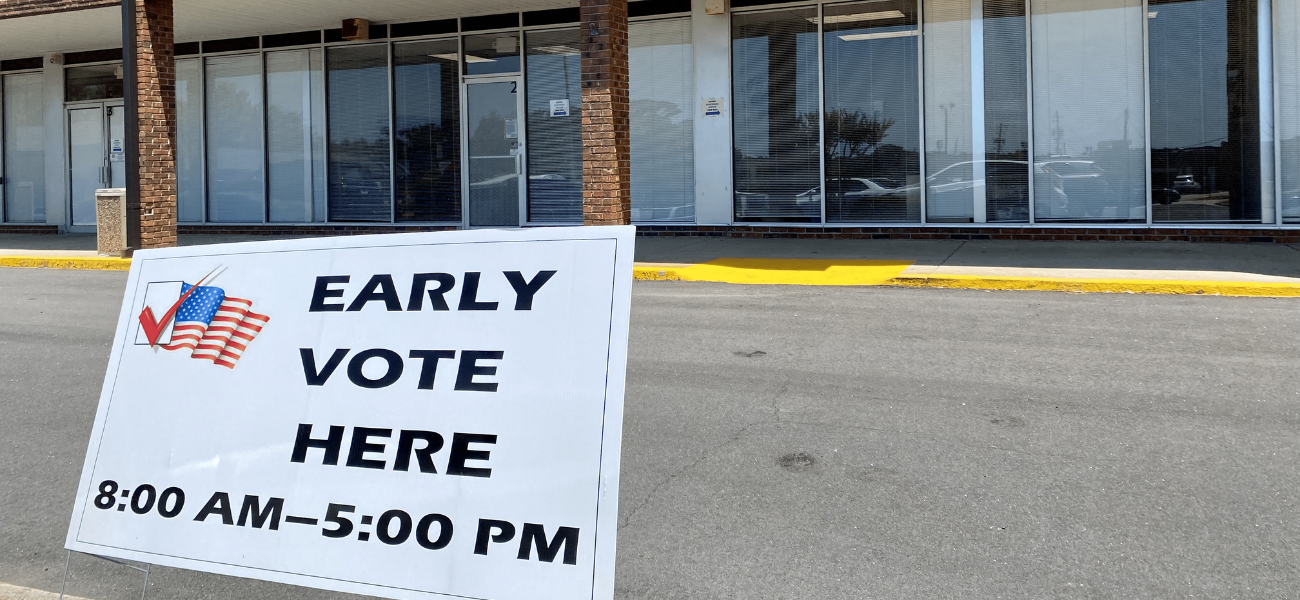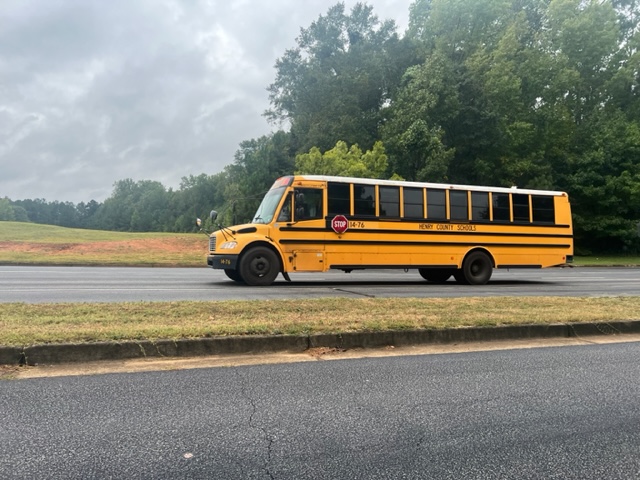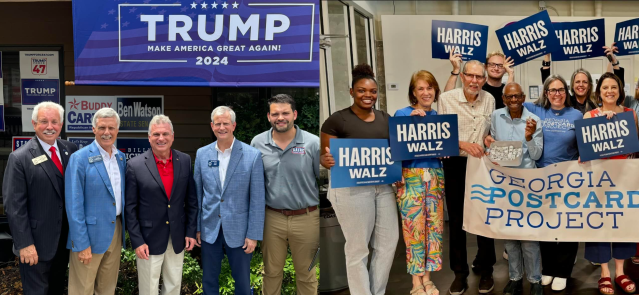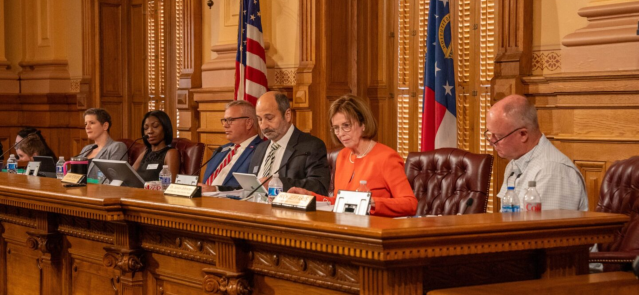Stay ahead of the curve as a political insider with deep policy analysis, daily briefings and policy-shaping tools.
Request a Demo
(Credit: Beau Evans)
- New State Election Board rules frustrate election administrators
- Rule calls for absentee voters to sign a form when dropping off their ballots, but critics say no one has seen the form
- Other mandates are unclear or impractical, says head of Georgia Association of Voter Registration and Election Officials
If you plan to hand-deliver your absentee ballot to your local election office this year, you’ll have to show identification and sign a form stating whose ballot you’re dropping off, under a new rule recently passed by the State Election Board.
If you fail to show your ID or don’t complete the form, your ballot may not be counted.
Problem is, local election administrators have yet to receive the forms to distribute to voters.
“We haven’t even seen the form,” W. Travis Doss Jr., executive director of the Richmond County Board of Elections in Augusta, told State Affairs. “We don’t even know what this [form] is supposed to look like. I don’t know the wording or what it’s supposed to say.”
Under the new rule, the form is supposed to be provided by the Secretary of State’s office, Doss said.
“If so, this is the first I’ve heard of it,” Mike Hassinger, spokesperson for the secretary of state, told State Affairs. “I will double-check and get back to you.”
While the State Election Board, lawmakers and voting rights activists tussle over the new and proposed rules, election administrators such as Doss are worried about their ability to implement the rules.
“We’re in limbo as far as how we’re supposed to do this,” Doss said.
The general election is two months away, and so far many of the new rules —and proposed rules — are running up against time and practicality. Doss’ association has tried to convey to the State Election Board the enormity of what it will take to carry out the changes. Absentee ballots must be received before polls close on election day to be counted.
Much of what the board is doing is revising or amending existing state election rules. The State Election Board recently passed several new rules, and nearly a dozen others are slated for decision at the board’s Sept. 20 meeting.
“We’ve given them input. They just haven’t listened to us,” said Doss, who is also president of the 500-member Georgia Association of Voter Registration and Election Officials.
Michael Coan, executive director of the State Election Board, did not respond to State Affairs’ request for comment.
The changes come as county election officials are preparing to train hundreds of poll workers statewide for the Nov. 5 election. Training can take weeks, especially in larger communities. New rules that haven’t clearly been defined or executed create confusion, Doss said.
“It makes no sense to be passing rules in the ninth hour of a major election,” Milton Kidd, Douglas County’s director of elections and registrations, told State Affairs. “All the proposed rules are causing chaos within the elections process which has already begun.”
Kidd said he hasn’t heard of any election staff who are on board with the changes being made by the State Election Board.
The State Election Board has “not communicated to any elections office how we are to go about doing this. You pass a rule without any guidance,” Kidd said. “For elections administration, it works best when you have time to work out the details of a rule before an election begins.”
The absentee ballot forms are just one of the many concerns of election administrators.
A rule passed in August requires election boards to do a “reasonable inquiry” before certification. This mandate has gained the most attention and controversy. Under this new rule, local election boards could refuse to certify election results if they suspect irregularities or fraud. Critics said the new rule is disruptive and dangerous. They fear county election officials could use the rule to delay certification of election outcomes they don’t like. The rule took effect Wednesday.
Another new rule calls for local boards to meet no later than 3 p.m. the Friday after an election to review precinct returns. Under previous rules, boards had until 5 p.m. Friday.
“It doesn’t take into [account] the law that allows until the end of the day on Friday for us to cure and verify absentee ballots, provisional ballots and receive military [and overseas] ballots,” Doss said. “That [new] rule is calling for boards to meet at 3 p.m. on Friday to compare vote totals when we don’t even have all the votes.”
Cure is a process that allows voters to fix minor errors on their ballots that are usually tied to security measures designed to verify a voter’s identity. One proposed rule calls for poll workers to finish counting ballots the night of the election or, at the manager’s discretion, return the next morning to do so. The proposal, which is on the board’s Sept. 20 agenda, is problematic because it requires the same poll workers who did the counting on election night to continue the count the next day.
“Many of our poll workers are also full-time employees [who work other jobs],” Doss said. “We are very fortunate that they take the day off to work the elections, but that doesn’t mean they can take a second day off to come to our office and hand-count the ballots. If the rule said anybody could hand-count, then I wouldn’t have a problem with that.”
Another proposed rule before the board on Sept. 20 requiring absentee ballots to be mailed by Oct. 9 conflicts with the military’s 45-day deadline for ballot mailing.
If passed, Doss said, “it would not take effect until Oct. 9” — well after the Sept. 21 deadline when all ballots headed to military personnel must be in the mail.
“It’s just a hastily, ill-conceived rule that should never have been allowed to go into the rulemaking process,” Doss said, adding that he has never had to deal with this many electoral rule changes so close to a major election in his nearly 30 years in election administration.
“Statewide, we are all extremely concerned and frustrated,” he said. “It’s like we have a starring role in the remake of ‘Murphy’s Law.’ What can go wrong will go wrong. That’s kind of what we feel like right now.”
Interested in going?
The next Georgia State Election Board meeting is Friday, Sept. 20, from 9 a.m. to 5 p.m. in Atlanta at the Georgia State Capitol, 206 Washington St. SW, Room 341.
Rules to be proposed at the Sept. 20 State Election Board meeting
Here’s a look at some of the proposed rules:
1. Improve security and chain of custody by making scanned copies of absentee ballots visually distinct from provisional and emergency ballots. Absentee ballots marked distinctly from provisional/emergency ballots will serve as a visual cue to assist in chain of custody.
2. Reconcile tabulator tape ballot counts with scanner ballot counts to ensure the voting system is correctly counting ballots and detecting potential errors, which requires the poll manager and two witnesses to record the ballot count from the tabulation tape on the recap form.
3. Ensure secure, transparent and accurate ballot counting by requiring a systematic process where ballots are independently hand-counted by three sworn poll officers. Once all three counts match, the poll officers sign a control document. If discrepancies arise between the hand count and recorded totals, the poll manager must resolve and document the inconsistency. The counted ballots are sealed in labeled containers and signed to ensure integrity.
4. Ensure the public can readily view the Reconciliation Report, which outlines discrepancies between the total ballots cast and the total number of voters credited with voting in each precinct within 30 days of certifying election results. The Reconciliation Report will be visible to the public via the county election results website or in the county elections office.
5. Affirm that Georgians have access to an essential part of the oversight of the election process and instill confidence in Georgia elections by requiring counties to post a publicly accessible, time-stamped list of registered electors before advance voting begins, with the secretary of state also posting a statewide list. Counties must post a supplemental list before advance voting, with the secretary of state doing the same for the state. Counties without websites must make the lists available at their election offices.
Source: Georgia Association of Voter Registration and Election Officials
Have questions, comments or tips? Contact Tammy Joyner on X @lvjoyner or at [email protected].
Weekend Read: New school buses arrive spring ’25; schools grapple with bus driver shortages
The Gist Georgia has ordered 256 new school buses to relieve the aging fleets in public schools around the state, but most of those new buses won’t be on the road until the end of this school year. What’s Happening “We’ll be looking at springtime before those buses start rolling,” said Ken Johnson, pupil transportation …
Mega Millions has generated over $17M in HOPE, pre-K funding since June
By now you’re acutely aware you’re not holding the winning ticket to this week’s $810 million Mega Millions Jackpot. That honor goes to a Texan who matched all six numbers. Take solace, though, knowing your weekly spending on lottery tickets in Georgia helps preschoolers get an early educational start and pays students’ way through college …
Presidential race aside, what’s at stake for Georgians in the November election?
The Gist Despite all 236 members of the state House and Senate up for reelection in November, the presidential race has taken center stage in Georgia with the nomination of Vice President Kamala Harris for U.S. president. Nonetheless, Georgia Democrats will be in a push-and-pull contest to gain more seats in both the House and …
Weekend Read: State Election Board marks its 60th year mired in controversy. Here’s what happened.
In 1964, Georgia lawmakers retooled the state’s election process to create a “one person, one vote” system after the U.S. Supreme Court outlawed the “county unit system” that held sway over Peach State politics for nearly half a century. Until then, politicians hoping to win primaries in Georgia had to capture entire counties, not just …




